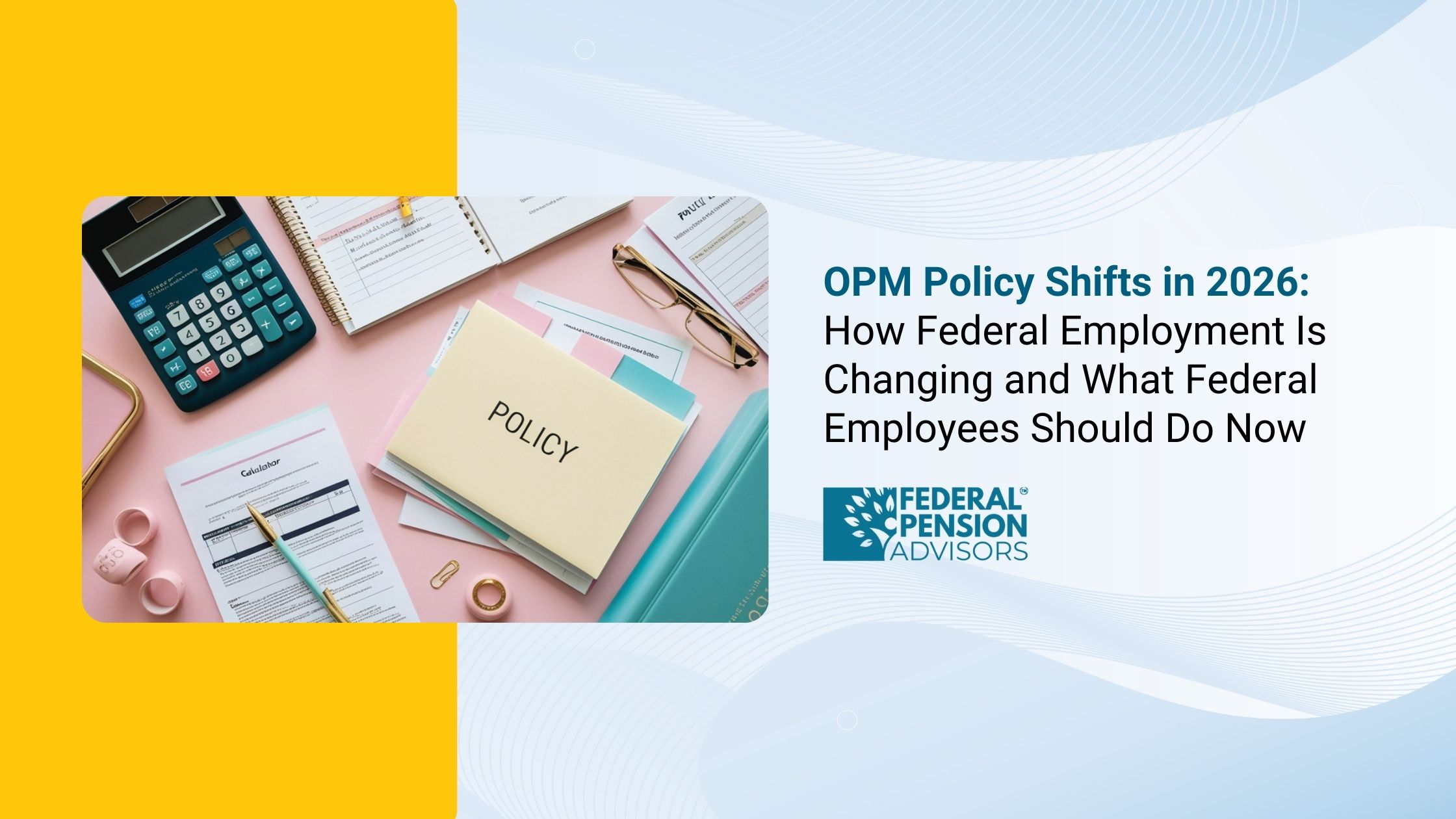You’re not alone; 4,359 federal employees booked their free review.

Should You Hire a Financial Advisor? The Real Pros and Cons for Federal Employees
For many federal employees approaching retirement, hiring a financial advisor feels like a major decision. After years of managing your TSP contributions, understanding your FERS benefits, and balancing family goals, you may wonder do I really need professional help now?
It’s a fair question. We meet many clients who’ve done an excellent job saving and investing on their own. But when it comes to converting savings into income that’s where complexity creeps in. Taxes, withdrawal rules, survivor benefits, and inflation can all change the outcome.
Let’s take an honest look at the pros and cons of hiring a financial advisor, especially for those planning to retire from federal service.
What a Financial Advisor Actually Does
A financial advisor isn’t just someone who picks investments. Think of them as your financial project manager coordinating all the moving parts of your retirement plan so nothing falls through the cracks.
In our work with federal employees, that often means aligning:
- TSP investments and withdrawals with retirement income needs
- FERS or CSRS annuity timing with Social Security
- Tax planning for survivor benefits and RMDs
- Long-term care and estate plans to protect your family
The goal isn’t just returns it’s confidence and clarity. Most of our clients want to know one thing: Will my income last as long as I do?
The Pros of Hiring a Financial Advisor
1. A Comprehensive Financial Strategy
Most federal employees have several income sources TSP, FERS annuity, Social Security, maybe a spouse’s pension or private investments.
An experienced advisor helps you coordinate them into one plan that covers both today’s income and tomorrow’s needs.
We often begin by asking, “What do you want your monthly retirement income to look like?” From there, we map out a strategy that balances guaranteed income with flexible withdrawals so you can plan your lifestyle, not just your budget.
2. Staying the Course During Market Volatility
Anyone can make a plan when markets are calm. The real test comes when volatility hits.
We’ve seen TSP participants panic during market drops shifting everything to the G Fund at the worst possible time. Those who had a trusted advisor by their side often made more disciplined, long-term decisions.
A good advisor helps you focus on the plan, not the panic. That emotional discipline can make a surprising difference in lifetime returns.
3. Time Savings and Peace of Mind
Managing your own retirement plan can easily turn into a full-time job. Between market updates, tax law changes, and TSP reallocation options, it’s easy to get lost in the details.
One of our retired clients once said,
“The best part about working with an advisor wasn’t the returns it was getting my weekends back.”
If you’d rather focus on travel, grandkids, or hobbies than spreadsheets, delegation can be worth every penny.
4. A Fiduciary Advisor Works for You Not a Commission
A fiduciary advisor is legally required to act in your best interest.
By contrast, a “suitability” advisor only needs to recommend something that’s okay for you even if it costs more or pays them a higher commission.
In our experience, the fiduciary relationship changes everything. It removes the sales pressure and replaces it with trust and transparency. Always ask a potential advisor to confirm in writing that they act as a fiduciary at all times.
5. Planning for the Unexpected
Retirement isn’t a straight line. Markets fluctuate. Health changes. Family needs arise.
An experienced advisor helps you prepare for those moments before they happen building in cash reserves, adjusting withdrawal rates, and rebalancing to keep your income plan sustainable.
We often remind clients: “Flexibility is one of the most underrated forms of security.”
6. Clarity About What Your Money Can Do for You
A truly great advisor helps you reconnect your finances to your life.
We’ve had clients tell us they finally felt peace after seeing their plan on paper knowing their income was set, their family protected, and their goals aligned.
Money is a tool, not a goal. The right plan helps you use it intentionally whether that means early retirement, travel, helping family, or simply enjoying the freedom you’ve earned.
Don’t wait until your retirement date to find out what you could’ve done differently. The best time to create your income plan is before the decisions become permanent. Schedule your consultation now your future self will thank you.
The Cons of Hiring a Financial Advisor
1. Fees Can Add Up
Advisors typically charge a flat annual fee, hourly rate, or a percentage of assets (usually 1%).
For example, if you have $600,000 under management, a 1% fee means about $6,000 per year.
Good advisors are worth the cost through improved returns, tax savings, and behavioral discipline but not all advisors justify their fees.
Always ask:
- How are you compensated?
- What does that include and not include?
- What’s your total annual cost?
If those questions make the advisor uncomfortable, that’s a clear signal to look elsewhere.
2. Varying Qualifications
Unfortunately, anyone can call themselves a “financial advisor.” That’s why credentials matter.
Look for:
- CFP® (Certified Financial Planner)
- ChFC® (Chartered Financial Consultant)
- FIDUCIARY status
- Specific experience with federal benefits TSP, FERS, CSRS, and FEGLI.
You can verify licenses through FINRA’s BrokerCheck or the CFP Board.
3. Finding the Right Fit
A great advisor for someone else might not be the right advisor for you.
You should feel comfortable asking questions, sharing goals, and expecting clear communication. In our experience, the best relationships are built on mutual trust not salesmanship.
Think of it like hiring a doctor or attorney: you want someone competent, objective, and personally compatible.
How to Know If You Really Need One
Ask yourself:
- Do I have time to manage my retirement plan confidently?
- Do I understand how my TSP, pension, and Social Security work together?
- Do I have a written withdrawal and tax plan?
- Am I confident managing investments through market changes?
If any of those give you pause, a fiduciary advisor can likely add value.
For federal employees, that’s especially true during the transition years from accumulation to income when tax, survivor, and timing decisions become irreversible.
5 Questions to Ask Before You Hire an Advisor
- Are you a fiduciary 100% of the time?
- How are you paid and what’s the total cost each year?
- What is your experience with federal retirement benefits?
- How often will we review my plan?
- Can you share examples or client scenarios similar to mine?
The answers will tell you more about an advisor than any sales brochure ever could.
What Changes After You Hire an Advisor
In our experience working with federal retirees, the most noticeable change isn’t in returns it’s in relief.
Once their plan is in place, clients stop checking their TSP balance every day. They stop second-guessing market moves. They start thinking less about money and more about what comes next in life.
That’s what a good advisor delivers: structure, confidence, and calm.
Key Takeaways
- A financial advisor can provide expertise, structure, and peace of mind especially during retirement transitions.
- Fees and qualifications vary widely always verify credentials and ask about fiduciary status.
- The right advisor acts as a guide, not a salesperson.
- For federal employees, the real value is coordination making your TSP, FERS, and Social Security work together efficiently.
- Trust, transparency, and fit matter as much as financial performance.
Next Step: Let’s Build Your Federal Retirement Strategy
If you’re preparing to retire or already retired and wondering whether professional guidance could simplify your life, let’s talk.
Our team specializes in federal retirement income planning, helping employees and retirees coordinate their TSP, FERS, and Social Security benefits for stable, tax-efficient income.
Schedule a complimentary consultation today and let’s see whether professional advice could give you the clarity and confidence you deserve for the next chapter.
Content source
Government Executive
FEEA
FEB A Benefits
National Treasury Employees Union
aws Federal Advisors
Disclaimer
This article is for educational purposes only and should not be considered individualized financial or investment advice. Past performance is not indicative of future results. Always consult with a qualified fiduciary financial advisor before making any investment or withdrawal decisions. The author and firm are not affiliated with or endorsed by the Thrift Savings Plan, the Federal Retirement Thrift Investment Board (FRTIB), or any U.S. government agency.


Get Updated
Subscribe to our weekly updates for the latest on retirement planning, federal benefits, exclusive webinars, and more!
Download Federal Retirement: Step-by-step Checklist
This comprehensive guide will help you understand your federal benefits, optimize your savings, and plan for a comfortable future.



.png)








